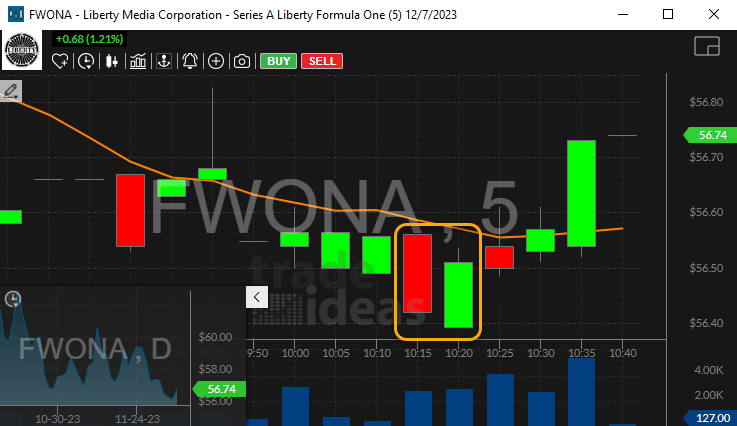5 Minute Piercing Pattern
Table of Contents
- Understanding the 5 Minute Piercing Pattern Alert
- Default Settings
- Custom Settings
- Description Column
- Quality Column
Understanding the 5 Minute Piercing Pattern Alert
This alert signals the appearance of a piercing pattern on a traditional 5-minute candlestick chart. Components of a piercing pattern include:
-
The first candlestick is typically a red or bearish candlestick, indicating a downward price movement
-
The second candlestick is a green or bullish candlestick, indicating an upward price movement
-
The bullish candlestick "pierces" the body of the first one, opening below the previous candle and closing above the midpoint of the previous bearish candle.
This pattern suggests a shift in market sentiment from bearish to bullish, as buyers have started to exert control.
Default Settings
By default, the 5 minute piercing pattern alert appears when there is a piercing pattern on a 5 minute candlestick chart.


Custom Settings
For '5 Minute Piercing Pattern' alerts, you have the option to use an alert specific filter. This filter is located immediately to the right of the corresponding alert and is always optional. You can decide to leave it blank if you want to receive more alerts, or you can fill it in to restrict the number of alerts you receive. This filter allows you to specify the quality of the alert. When you set a higher number for this filter, you are telling the alerts server to display only alerts that meet a higher quality standard, resulting in fewer alerts being shown.
When setting an alert for '5 Minute Piercing Pattern', the user can filter these alerts by a grade of how on how closely the stock chart matches the ideal shape of the stock pattern. 0 would mean there was no match. 100 would mean it's an ideal match.

Description Column
The description of the alert will give a more comprehensive breakdown of the alert.

Quality Column
The quality value on a scan using the "5 Minute Piercing Pattern" represents the grade based on how closely the stock chart matches the ideal shape of the stock pattern. 0% would mean that there was no match at all. Of course, if a stock pattern is this poor a match, then we are unlikely to report an alert. 100% would be an ideal match. Again, this would be an ideal and extreme case. Few if any alerts come close to 100%.

Alert Info for 5 Minute Piercing Pattern [PP5]
- description = 5 minute piercing pattern
- direction = +
- keywords = Candle Pattern End Of Candle Fixed Time Frame
- flip_code =
 5 minute dark cloud cover [DCC5]
5 minute dark cloud cover [DCC5] - parent_code =






 10 minute piercing pattern [PP10]
10 minute piercing pattern [PP10] 15 minute piercing pattern [PP15]
15 minute piercing pattern [PP15] 30 minute piercing pattern [PP30]
30 minute piercing pattern [PP30]